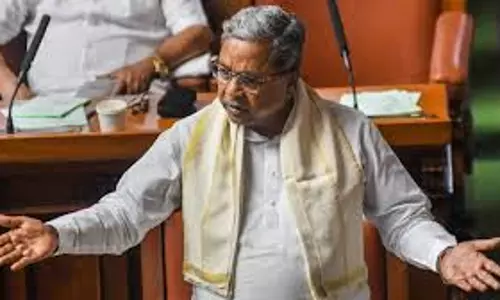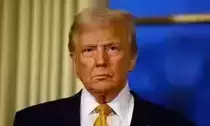
Trump firm on reciprocal tariffs, calls them necessary "medicine"
text_fieldsWashington: As global stock markets plunged on Monday, US President Donald Trump defended his controversial tariff policies, dismissing concerns over the economic impact. He said that the world leaders are "dying to make a deal" to negotiate the reciprocal tariffs.
With Asian markets plummeting and US futures indicating further declines, Trump described the market volatility as a necessary "medicine" to fix longstanding trade imbalances, downplaying concerns about the economic impact.
On Sunday, US President Donald Trump dismissed concerns that he intentionally triggered the recent market downturn, stating he couldn't predict market reactions. He emphasised that the US won't enter trade agreements with countries that don't address trade deficits.
"Sometimes you have to take medicine to fix something," Trump said, referring to the market volatility.
US companies have lost trillions of dollars in market value since President Trump's tariff policies took effect, leaving investors on edge and anticipating more economic turbulence.
Trump is downplaying the severity of the market downturn, describing any adjustments as "temporary". On Air Force One, Trump told reporters he had spoken with global leaders over the weekend, claiming many countries are now eager to negotiate trade deals.
"They're dying to make a deal," he said, reiterating his stance that tariffs were a necessary tool to level the global playing field.
The Trump administration remains committed to its aggressive tariff strategy, undeterred by global market losses that some fear could spark a full-blown economic downturn.
China has retaliated with tariffs, escalating trade tensions and fuelling fears of a global economic downturn. Economists warn that the US's current path could lead to a severe recession, with far-reaching consequences for the global economy.
Bruce Kasman, Chief Economist at JPMorgan, put the risk of a recession at 60 per cent, citing the potential for Trump's trade policies to tip a healthy global expansion into a crisis.
The turmoil in the markets has sparked comparisons to the 1987 "Black Monday" crash, which saw global markets lose $1.71 trillion in a single day.
CNBC's Jim Cramer warned that if Trump's trade policies continue, markets could face a similar catastrophic event. As the markets brace for another volatile week, all eyes remain on the White House and the next steps in the ongoing trade conflict.
(inputs from IANS)


















